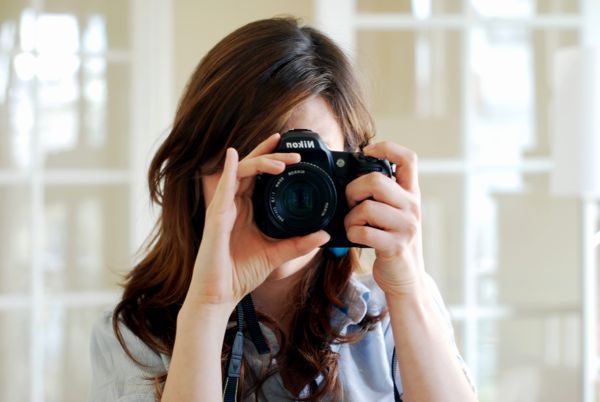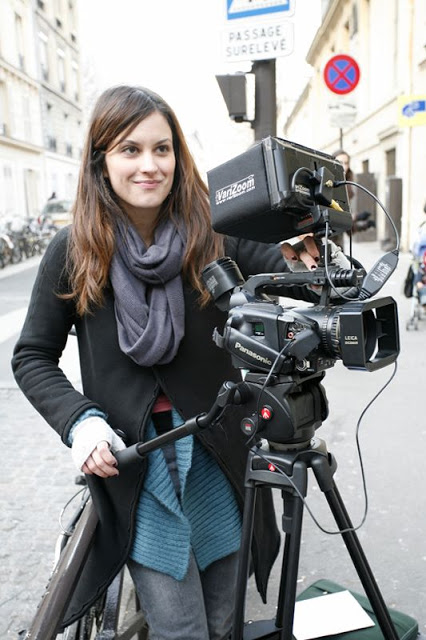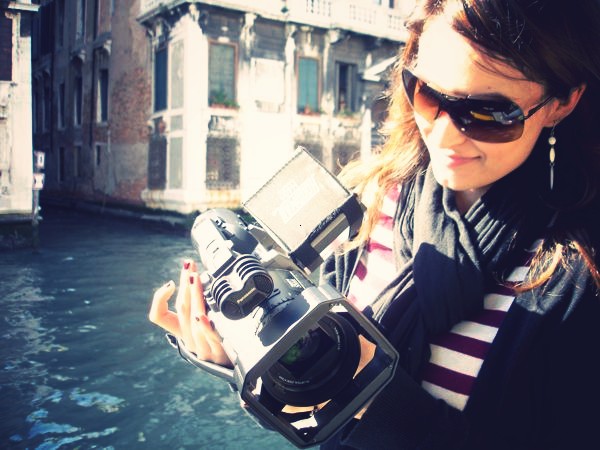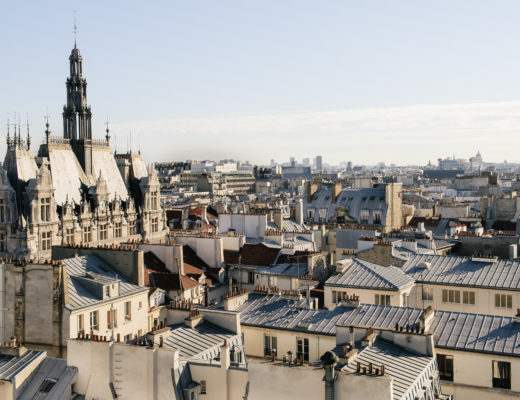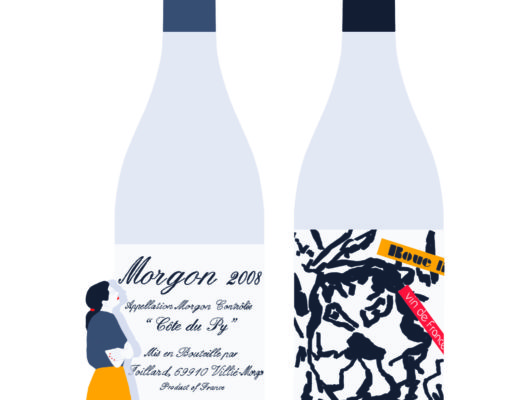It has almost been a year since I met Elena and I feel lucky to have become her friend. An Italian, honorary American and expat in Paris, Elena impresses with more than just her linguistic skills. Her two big projects, No Country for Young Women and The Illusionists deal with issues primarily centered around women – body image, the beauty myth, marketing manipulation and gender discrimination. I was honored to have been interviewed for her No Country project which now counts a long list of text and video interviews from women of all ages, backgrounds and professions. A perfect candidate for the project is Elena, herself but alas, she prefers to stay behind the camera. Fortunately, she was more than happy to answer a few questions for me.
You completed both your undergraduate and graduate degrees in the United States. What pulled you toward an American education? How do you think it has benefited you professionally?
I grew up in a small town of 5,000 souls in Lombardy, Northern Italy. And for as long as I can remember, as a child I had an innate fascination with the United States. At 10, for my final oral exam in elementary school, I chose to talk about the history of the United States. I’m not really sure where that came from. From an early age, I was determined to become fluent in English and to live in the United States.
At 15, I spent three weeks studying English on the campus of Pepperdine University in Malibu. I was instantly hooked. I still remember how transfixed I was by the school’s pristine facilities, the well-organized, efficient staff, and the friendly teachers – it was so different from my experiences in Italian schools. Everything looked light years ahead. That was my number one motivation for pursuing my studies in the United States. I wanted to get on the “fast lane” so to speak. America looked like a shiny land of opportunity, whereas Italy seemed like a lethargic, worn-out country.
I have been extremely lucky to have supportive parents who allowed me to pursue my goals. The six years I spent in America are, to this day, the best years of my life. They have benefited me in innumerable ways, both personally and professionally. There are too many things to list: my love letter to America could fill a 3-volume book! Obama’s campaign slogan “Yes We Can!” best encapsulates what I love about the United States: a sense of optimism, drive, and purpose, the feeling that dreams are within one’s reach.

Your work seeks to reveal and understand the inherent contradictions within the beauty and fashion industries and their subsequent implications on the female self-confidence and body image. Did the desire to pursue this particular topic originate from a particular incident (or particular incidences) in your personal life? If not, what are some of the factors that contributed to your interest?
Actually, what has drawn me to this subject is the issue of advertising and mass media manipulation; the beauty and fashion industries are only the tip of the iceberg. I am intrigued by what lies beneath: the sophisticated studies that have been carried out as early as 1903 on consumer behavior and motivational marketing. To paraphrase one of my favorite authors and heroes – Vance Packard – advertisers and marketers understood early on that sales depended to a large extent on manipulating our hidden fears and anxieties. They have been exploiting that ever since.
Deep down, what really intrigues me is the notion that happy people are considered “bad consumers” by advertisers and marketers. And thus they prey on people’s insecurities and manufacture desires and goals that are very difficult – if not impossible to attain. Like our obsession over looking eternally young: there’s endless consumerism built around that. Entire industries would crumble if the majority of women started loving and accepting their bodies – regardless of their age, skin color, shape, or bra size.
Unfortunately, even though it’s 2010, women are still judged first and foremost based on their appearance, irrespective of their professional or personal accomplishments. I find this rather primitive.
Your project, No Country for Young Women, looks at gender and age discrimination in the workplace. As someone who has worked in 4 different countries – the US, England, Italy and most recently France, where did you find this to be most prevalent and did it affect you directly?
Professionally speaking, I have had the toughest time in France, but for reasons that transcend age and gender discrimination – they are cultural and systemic issues. Meritocracy is virtually nonexistent in France: “copinage” (nepotism) is widely practiced across the board. Young professionals under the age of 35 – male or female – have a hard time being taken seriously. What I sometimes find heartbreaking is that very little is expected of me – but my French boyfriend has the same experience. It really goes both ways. There is also a rather monolithic order in French companies and society: rules set in stone, fear of change and conformism. So, being an Italian born, American-educated rebellious spirit has been hard in France. But I welcome the challenges.
Whenever there is an issue that bothers me, I tend to face it head on and turn it into a project. Last fall I spent three blissful weeks in the United States, attending women’s conferences and networking with inspiring activists. A week after my return to Paris, I purchased a leading French business magazine and flipping through its pages I could not find a single photo of a woman. Only older, white French men, page after page. Finally, there she was, midway through the magazine: a scantly clad woman in an ad for a car. I registered the domain name nocountryforyoungwomen.com the same day and everything followed from there. The project has brought me immeasurable satisfaction and has allowed me to channel my frustrations into something positive.
Photo: Danielle Voirin
We can also add website designer, photographer and writer to your artistic arsenal. What about film attracts you more than your other talents?
I feel in love with filmmaking relatively late: at the age of 22. Before then, I wasn’t really sure what the future would hold for me. All I knew was that I loved writing, reading, watching art house films, taking photos, and doing graphic design. In filmmaking I found an activity that incorporates all my passions: I have been writing, directing, shooting, and editing 99% of all the projects I have worked on. I don’t even register fatigue when I am shooting or editing a film: I have such a great time that I can go on for 12-hour stretches without the slightest hint of weariness. In most photos of me taken on set, you can see a Cheshire Cat smile permanently fixed on my face. I simply love filmmaking.
You’ve mentioned having mixed feelings about the idea of ever living in Italy again. Can you elaborate on this?
I am extremely proud of being Italian – my home country has a rich cultural heritage that I admire tremendously. Just thinking of some of the luminaries that Italy has produced over the centuries gives me goosebumps: Dante, Petrarca, Galileo, Leonardo, Michelangelo, Verdi, Fellini… (You gotta love a country in which they start making you study Dante at the age of 11). I also love the sunny disposition of Italians, how passionate they are, their aesthetic sense, the constant search for beauty and excellence in everyday things. Not to mention close family ties: Italian moms are true Wonder Women (I call mine at least once every two days – she’s my best friend).
I enjoy immensely the time I spend in Italy but I don’t envision settling down there for reasons cited before: it is an aging, lethargic country ruled by a farcical political elite, that is going through a rapid cultural decline.
That said, the person I admire the most in this world is Italian, living in Rome: Nobel laureate Rita Levi Montalcini, who at 101 (yes, 101) still gets up every day at 5 AM and goes to work in her lab, supervising a team of all-female scientists. In the afternoon she heads to her foundation on the other side of Rome, devoted to improving African women’s education. She has such moxie!
What is your all-time favorite film and why?
“8 1/2” by Federico Fellini. The film has a multi-layered script full of subtext, that manages to be both highbrow and accessible, dark and playful. It’s superbly acted by an ensemble cast headed by Marcello Mastroianni – who’s basically playing the alter ego of Fellini. The cinematography by Gianni di Venanzo is breathtaking. The film is edited in a non-linear way, jumping seamlessly back and forth in between the present, dreams and flashbacks. The sound design of the film is also very sophisticated – with melodies that one can faintly hear from time to time, each associated with a particular memory or feeling of Marcello/Guido. I should know, because I have seen the film at least 10 times: I discover new things at every viewing.
Five year plan – where do you see yourself?
My number one goal is to finance and complete my documentary The Illusionists – our current plan is to make a 100-minute film, a companion book, and an interactive, participative web site. My (and my producers’) ultimate goal is to make much more than a film: it’s a mission, if you will – to create something that will generate discussions on self–esteem and media literacy. Some films take up to 5 years to make, so I hope that by 2015 all my hard work will have paid off and that The Illusionists will have seen the light. If the film manages to improve the body image of even just one woman, I will be tremendously happy.
Five years from now I also see myself still working on projects related to women and power. I want to combine my love for travel and my interest in gender issues, filming interviews of women for No Country in various locations around the world.
On a personal level, hopefully by 2015 I will have become fluent in yet another language (I’m working on it) and I will have lived in a new country. I am at my happiest while exploring new, unfamiliar environments and my experiences abroad have enriched my life in inestimable ways. I feel that, at age 30, I have already had five different lives. The thought of finding myself in Berlin’s Mitte neighborhood, five years from now, sitting down at a cafe with friends while speaking perfect German makes me giddy with excitement.
A big thank you to Elena! Be sure to check out her websites and follow her work, she’s doing some amazing things.





